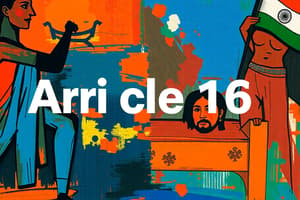Podcast
Questions and Answers
What is the age range for children that the state must provide free and compulsory education to?
What is the age range for children that the state must provide free and compulsory education to?
- 5 to 16 years (correct)
- 3 to 16 years
- 3 to 18 years
- 5 to 18 years
Why can fundamental rights be suspended according to the text?
Why can fundamental rights be suspended according to the text?
- When the citizens misuse their rights
- During times of peace and stability
- When the state itself is in danger (correct)
- To show power by the government
What is the main difference between fundamental rights and ordinary rights based on the text?
What is the main difference between fundamental rights and ordinary rights based on the text?
- Fundamental rights are enforceable under the constitution (correct)
- Fundamental rights are granted by an ordinary law
- Ordinary rights have a wider scope of application
- Fundamental rights are not enforceable against the government
What is the role of the High Court and Supreme Court of Pakistan regarding fundamental rights?
What is the role of the High Court and Supreme Court of Pakistan regarding fundamental rights?
Why are fundamental rights considered crucial for a democratic constitution according to the text?
Why are fundamental rights considered crucial for a democratic constitution according to the text?
Can fundamental rights be suspended without following constitutional methods as per the text?
Can fundamental rights be suspended without following constitutional methods as per the text?
What fundamental right does every citizen of Pakistan have in respect of religion?
What fundamental right does every citizen of Pakistan have in respect of religion?
Which aspect of citizenship ensures that all citizens are entitled to equal protection under the law?
Which aspect of citizenship ensures that all citizens are entitled to equal protection under the law?
What right does every citizen of Pakistan have in relation to public places?
What right does every citizen of Pakistan have in relation to public places?
Under the constitution of Pakistan 1973, what safeguards are provided in relation to property rights?
Under the constitution of Pakistan 1973, what safeguards are provided in relation to property rights?
What fundamental right ensures that everyone charged with a criminal offence is presumed innocent until proven guilty?
What fundamental right ensures that everyone charged with a criminal offence is presumed innocent until proven guilty?
Which basic right is considered universal for every person according to the information given?
Which basic right is considered universal for every person according to the information given?
Flashcards are hidden until you start studying
Study Notes
Age Range for Free and Compulsory Education
- Children between 5-16 years old are entitled to free and compulsory education in Pakistan.
Suspension of Fundamental Rights
- Fundamental rights can be suspended during a state of emergency or when the country is at war.
Difference between Fundamental Rights and Ordinary Rights
- Fundamental rights are essential for a democratic constitution and are enshrined in the constitution, whereas ordinary rights are not.
- Fundamental rights are protected by the constitution and can only be changed through a constitutional amendment, whereas ordinary rights can be changed by law.
Role of High Court and Supreme Court
- The High Court and Supreme Court of Pakistan are responsible for ensuring the protection of fundamental rights.
- They have the authority to enforce and interpret fundamental rights.
Importance of Fundamental Rights
- Fundamental rights are crucial for a democratic constitution as they protect individual freedoms and ensure the rule of law.
- They provide a framework for citizens to participate in the democratic process.
Suspension of Fundamental Rights without Constitutional Methods
- No, fundamental rights cannot be suspended without following constitutional methods.
Right to Religion
- Every citizen of Pakistan has the fundamental right to freedom of religion.
- They are free to practice and profess their religion.
Aspect of Citizenship
- The aspect of citizenship that ensures equal protection under the law is the principle of equal citizenship.
- This principle ensures that all citizens are treated equally before the law.
Right to Public Places
- Every citizen of Pakistan has the right to access public places.
- This right is guaranteed under the constitution.
Safeguards for Property Rights
- The constitution of Pakistan 1973 provides safeguards for property rights, ensuring that private property is protected.
- The government cannot take away property without due process and compensation.
Presumption of Innocence
- The fundamental right that ensures everyone charged with a criminal offence is presumed innocent until proven guilty is Article 10A of the constitution.
- This right protects individuals from arbitrary arrests and detention.
Universal Basic Right
- The universal basic right considered fundamental for every person is the right to life, liberty, and dignity.
- This right is essential for human dignity and freedom.
Studying That Suits You
Use AI to generate personalized quizzes and flashcards to suit your learning preferences.




